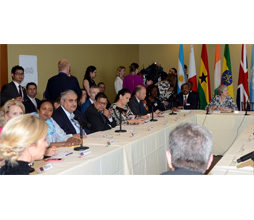Following a series of reported violations in August, human trafficking and migrant rights abuses have continued to emerge in Bahrain over the past month. On 18 September 2017, Bahraini authorities announced they would be prosecuting five men on charges relating to forcing domestic workers into prostitution. The Public Prosecution Office formally accused the men of human trafficking, rape, abduction, and other crimes. According to the announcement, five Asian women reported that they came to the kingdom to work as housemaids but left their sponsors and were later forced into prostitution by the defendants. Investigations are still ongoing to uncover the extent of this crime and how large the prostitution ring actually is.
Despite these apparent law enforcement efforts, the Government of Bahrain has failed to institute significant new measures to address trafficking and other migrant rights abuses. While top officials have attended high-profile meetings and expressed concern for this pressing issue, few real reforms have been seen. For example, the Labour Market Regulatory Authority (LMRA) Chief Executive Officer Osama Abdulla Al-Absi led Bahrain’s delegation to the meeting of the United Nations Economic and Social Commission for West Asia (ESCWA), which was held on 26 Setpember in Beirut, Lebanon. At this meeting Al-Absi spoke on the state’s new Flexi permit system, ensuring the rights of migrants, and the establishment of a center dedicated to protecting foreign workers. This followed a 20 September meeting on forced labor, modern slavery, and human trafficking at the United Nations in New York, where Foreign Minister Shaikh Khalid bin Ahmed bin Mohammed Al Khalifa stressed the need for immediate action, highlighting Bahrain’s ratification of relevant international conventions like the United Nations Convention on Transnational Organized Crime, as well as the Protocol to Prevent, Suppress and Punish Trafficking in Persons, Especially Women and Children.
But, while the extension of Bahrain’s rhetorical and international commitments to migrant rights is promising, these statements appear to have had little effect on recent rates of abuse. On 19 September, for example, local media reported that almost 80 expatriate workers were living in a single, unsafe building as a de facto camp. The building, which had been ordered to be demolished, was still covered a by a roof that had previously fallen in on the laborers inside the building. While the building was quite literally falling down around inhabitants, the land lord continued to charge rent and was even attempting to add further rooms to the building.
Similarly, earlier in the month, the body of a dead expatriate worker was finally returned to his home country of India for burial after years of legal complications. The worker, Thandavam had died in July after spending 35 years stuck in Bahrain because his legal paperwork had been lost. He died at the age of 58 having arrived in Bahrain in 1983. Thandavam’s body was kept in Salmaniya Medical Complex (SMC) mortuary for the past two months, labelled “unidentified”.
Fortunately, a comparable case finally appears to be reaching resolution: Udair Karuppaiah has spent two years in Bahrain after being abandoned in the kingdom by his Saudi sponsor. Without current legal documents that would allow him to leave the country and travel home to India, Karuppaiah had little recourse and was stuck in Bahrain. During the period of time in which he was stranded in Bahrain, his mentally disabled daughter passed away. After attempting to work with the Indian embassy and making desperate pleas to the media, Karuppaiah was told he would be sent home in August after his outstanding dues had been settled. When this plan was unsuccessful he again sought remedy, telling the media: “I have no money on me at all… I just want to go back home. Hope the officials understand the difficult state I am in.” Now, in October, it seems that the Indian embassy has successfully navigated Karuppaiah a way home and he is set to return imminently. Following this latest update, Karuppaiah was quoted as saying that “I am really thankful to the media for raising the issue and so delighted to be heading back home after years of misery.”
Though it appears his situation may finally be remedied, Udair is just one example of the many expatriates that continue to suffer under the abusive tenets of Bahrain’s sponsorship system. Given the language expressed by many government officials in the previous month, Bahrain should uphold these commitments and institute additional reforms to protect and address the needs of migrant workers.
Emily Stone is an Advocacy Intern at ADHRB.





